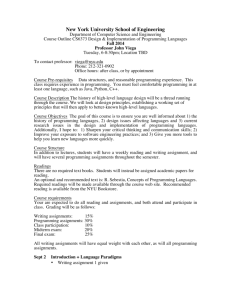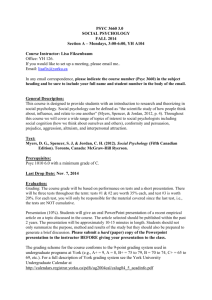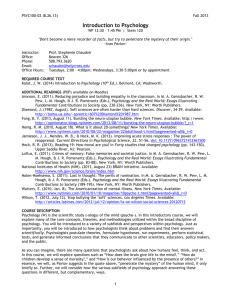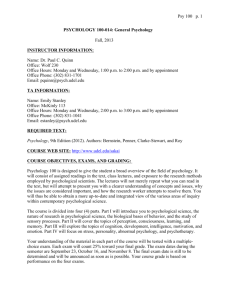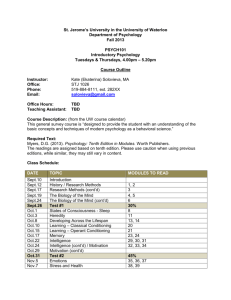Social Psychology Syllabus Example
advertisement
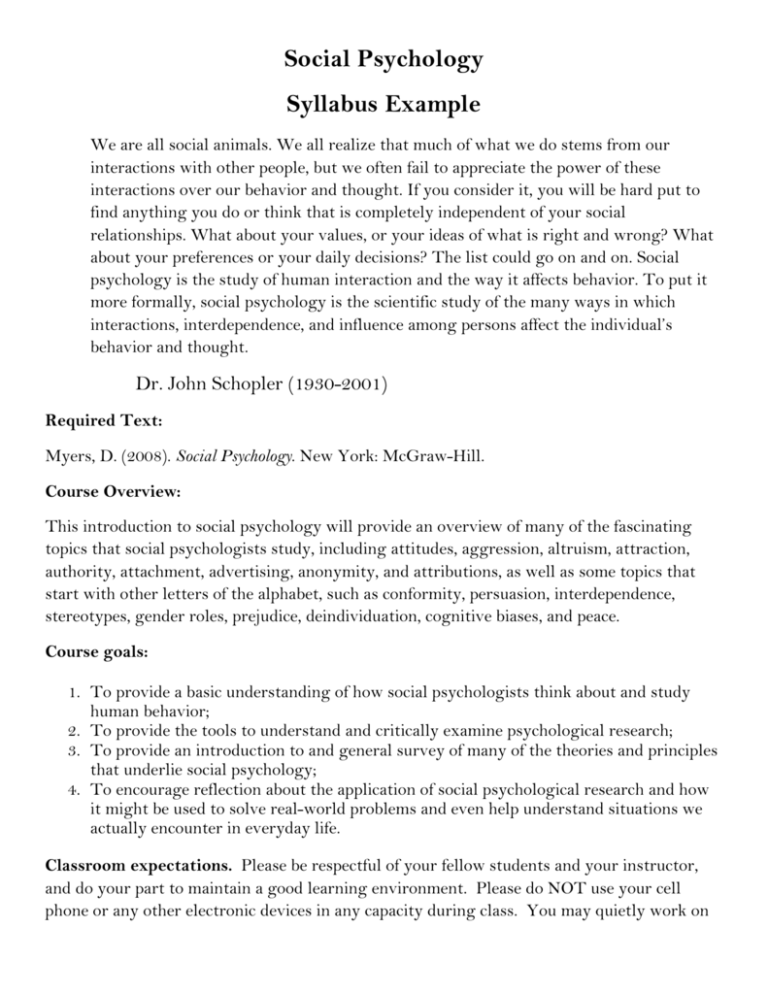
Social Psychology Syllabus Example We are all social animals. We all realize that much of what we do stems from our interactions with other people, but we often fail to appreciate the power of these interactions over our behavior and thought. If you consider it, you will be hard put to find anything you do or think that is completely independent of your social relationships. What about your values, or your ideas of what is right and wrong? What about your preferences or your daily decisions? The list could go on and on. Social psychology is the study of human interaction and the way it affects behavior. To put it more formally, social psychology is the scientific study of the many ways in which interactions, interdependence, and influence among persons affect the individual’s behavior and thought. Dr. John Schopler (1930-2001) Required Text: Myers, D. (2008). Social Psychology. New York: McGraw-Hill. Course Overview: This introduction to social psychology will provide an overview of many of the fascinating topics that social psychologists study, including attitudes, aggression, altruism, attraction, authority, attachment, advertising, anonymity, and attributions, as well as some topics that start with other letters of the alphabet, such as conformity, persuasion, interdependence, stereotypes, gender roles, prejudice, deindividuation, cognitive biases, and peace. Course goals: 1. To provide a basic understanding of how social psychologists think about and study human behavior; 2. To provide the tools to understand and critically examine psychological research; 3. To provide an introduction to and general survey of many of the theories and principles that underlie social psychology; 4. To encourage reflection about the application of social psychological research and how it might be used to solve real-world problems and even help understand situations we actually encounter in everyday life. Classroom expectations. Please be respectful of your fellow students and your instructor, and do your part to maintain a good learning environment. Please do NOT use your cell phone or any other electronic devices in any capacity during class. You may quietly work on the DTH crossword, but if you manage to complete the entire puzzle during class I will know that you were not contributing adequately to the class. Thanks! REQUIRED WRITTEN ASSIGNMENTS: All written assignments will be submitted via Blackboard. Thought Papers – Since one of the main goals for this class is to convince you of the usefulness and everyday value of social psychology, you will be asked to complete three brief thought papers on topics of your choice. For each paper you will choose one social psychological topic or theory, briefly explain this concept, then apply it to either a relevant current event or a relevant personal experience. You should be able to fulfill these requirements adequately in about one typed page. These papers will be due BY September 8, October 6, and November 10, but these dates will not be listed in the course schedule because you are strongly encouraged to submit them EARLY, or whenever a topic occurs to you during the term. No Thought Papers will be accepted after November 10. Sustainability Project - this larger project will be submitted in three phases: Problem Summary – After reading and discussing Chapter 16, you will write a 2-3 page summary of the chapter and/or the main problems it describes. Solution Summary – Based on your understanding of Chapter 16 and any other sources you may have encountered since your initial reading, you will write a 2-3 page paper explaining three to five potential “solutions” to these important issues. Final Paper – in this 4-5 page paper, you will use specific social psychological concepts to “bridge the gap” between understanding and implementing possible solutions to the important long-term problem of sustainability. EXAMINATIONS: You will have three exams over the semester. The exams will be a combination of multiple choice, true-false justify, and short answer. Additional information will be provided as each exam approaches. Make note of the exam dates now. These dates will NOT change, so plan accordingly. If you know ahead of time that you will be unable to attend an exam, please let me know as soon as possible so that we can make alternate arrangements. Participation: You will be expected to attend class and participate actively and meaningfully. You may also be subjected to pop-quizzes or brief homework assignments at random intervals throughout the term. These are simply meant to ascertain whether you are completing the required readings and staying alert and focused in class. These tasks will count as part of your participation grade and participation will be worth up to 40 points toward your final grade. ASSIGNMENTS and GRADING: Examination I 100 points Examination II 100 points Final Examination 200 points Thought Papers 3x20 points Problem Summary 50 points Solution Summary 50 points Final Paper 100 points Class Participation 40 points Your final grade will be assigned based on the total points you earn across the semester. For example, if you earn 630 total points it would be divided by the total points possible (630/700) and equal 90% (an A-). Academic integrity/Honor Code: Please do not engage in any behavior that you think might be considered a violation of the University Honor Code. I am generally easy-going, but I take academic integrity very seriously. Plagiarism and cheating will not be tolerated. All work must be your own. Honor Court is efficient and fair, but it is not fun. If you have questions about academic integrity, plagiarism, or any related issues, please let me know right away. I would much rather address your concerns now than risk facing the Honor Court later. (Some general questions may be answered at the site for the University Honor Code http://honor.unc.edu/). Course Schedule* August 19 August 21 August 26 August 28 Sept. 2 Sept. 4 Sept. 4 First Day! Intro to Social Psychology The Sustainable Future The Self The Self Problem Summary Due Social Beliefs and Judgments Chapter 1 Chapter 1 Chapter 16 Chapter 2 Chapter 2 Chapter 3 Sept. 9, 11 Behavior and Attitudes Chapter 4 Sept. 16 EXAMINATION I Chaps. 1-4 Sept. 18, 23 Sept. 25, 30 Oct. 2 Oct. 2, 7 Oct. 9 Genes, Culture and Gender Conformity Solution Summary Due Persuasion Group Influences Chapter 5 Chapter 6 Oct. 14 EXAMINATION II Chaps. 5-8 Oct. 16 Oct. 21, 23 Oct. 28, 30 Nov. 4 Nov. 6 Nov. 11, 13 Nov. 18, 20 Nov. 20 Nov. 25 Nov. 27 Dec. 2 Fall Break Prejudice Aggression Attraction Altruism Conflict and Peacemaking Applied in the Clinic FINAL PAPER DUE Applied in the Courtroom Thanksgiving Day Last Class/Review for Final Chapter 7 Chapter 8 Chapter 9 Chapter 10 Chapter 11 Chapter 12 Chapter 13 Chapter 14 Chapter 15 FINAL EXAMINATION - Thursday Dec. 11 at 4 pm *the dates on which various topics will be covered are approximate. Dates and chapters may be altered or adjusted as needed, but all exams and due dates (in bold) are immutable. Please plan accordingly. If you anticipate a conflict with your schedule, please let me know ASAP. We can arrange for you to take the exam early, but make-up exams will NOT be offered.



